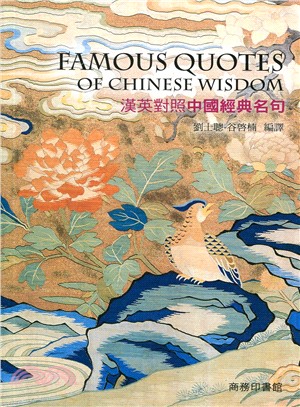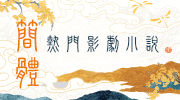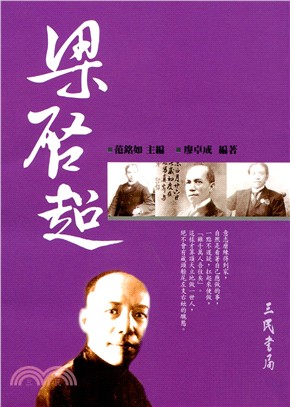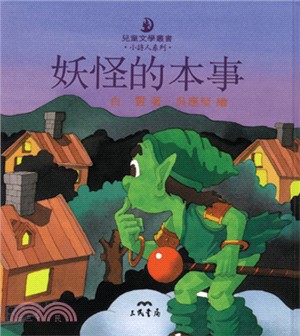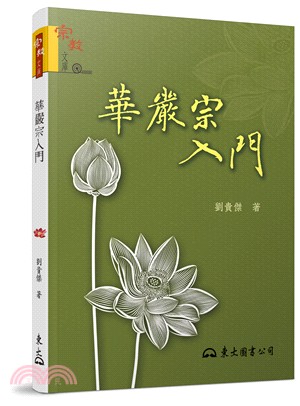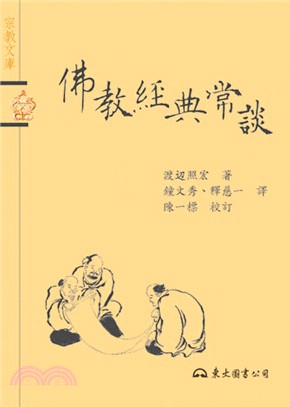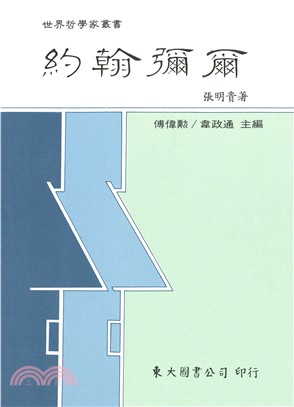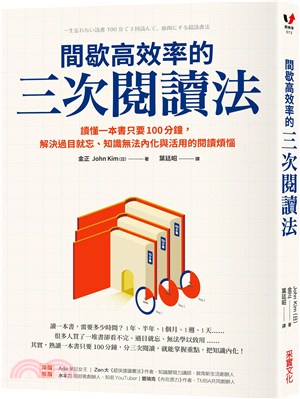再享89折,單本省下40元
商品簡介
作者簡介
谷啟楠,翻譯家,譯著有《達洛維太太》(Mrs Dalloway),《幕間》(Between the Acts)、《老人與海》(The Old Man and the Sea)。
目次
目錄 Contents
出版說明 Publisher’s Note…i
前言 Preface…iii
一 品德修養 Cultivate Moral Integrity
(一) 樹德修身 Develop Morality and Mold Character…1
(二) 持義守正 Uphold Justice and Maintain Honesty…8
(三) 謙恭 Modesty…15
(四) 誠信求實 Be Trustworthy and Realistic…19
(五) 知止節慾 Exercise Restraint…22
(六) 嚴己寬人 Be Strict with Yourself and Lenient with Others…25
(七) 大公無私 Be Unselfish…28
(八) 知恥從善 Knowing What Is Shame and Following What Is Good…30
(九) 勇敢頑強 Be Courageous and Steadfast…34
二 處事 Get along with People
(一) 謹慎 Be Prudent…37
(二) 名利富貴 Be Indifferent to Fame and Fortune…45
(三) 自強自立 Be Self-supporting…50
(四) 獨善其身 Be Self-edifying…52
(五) 隨遇而安 Adapt Oneself to Circumstances…54
(六) 淡泊 Be Nonchalant to Worldly Concerns…56
(七) 韜光養晦 Keep a Low Profile…58
(八) 隱居歸田 Pastoral Life…62
(九) 待人 Treating People the Right Way…63
三 識人 Understand People in Perspective
(一) 知賢 Distinguish People by Virtue and Talent…66
(二) 育人舉賢 Educate the People and Recommend the Virtuous…83
(三) 量才授任 Designate Assignment According to Competence…91
(四) 用眾成事 Make Concerted Efforts…94
(五) 不求全責備 No One is Perfect…98
(六) 不以尊卑長幼論人 One Should Not Be Judged by Age and Status…103
(七) 不以貌取人 Looks Can Be Deceptive…106
(八) 人老智可用 The Aged Has More Wisdom…108
(九) 用人信人 Trust the Person Employed…109
(十) 才能品德特別出眾者 Outstanding People…110
(十一) 成才須磨練 Talent is Cultivated through Hardships…111
四 處境 Situations Make the Difference…114
五 世態人情 Ways of the World
(一) 貧富懸殊 The Poor and the Rich…117
(二) 世事滄桑 Vicissitudes of Life…121
六 納言 Accept to Good Advice
(一) 博聽 Remain Open to Advice…124
(二) 不因人取言 Make Judicious Judgments of One’s Words…126
(三) 以實核言 Respect Reality…127
(四) 聽直排諛 Take Honest Words and Reject Flattering Ones…130
七 人倫關係 Human Relations…133
八 思想感情 Ideals and Feelings
(一) 愛國情懷 Patriotism…140
(二) 壯志凌雲 Soaring Ambitions…143
(三) 思人 Missing the Dear Ones…146
(四) 思鄉 Homesickness…148
(五) 別情 Part with Emotions and Return with Mixed Feelings…151
九 思想方法 Way of Thinking
(一) 審時度勢 Take Stock of Situations…153
(二) 自知之明 View Oneself in Perspective…155
十 教育與學習 Education and Study
(一) 學習態度 Attitude toward Study…156
(二) 教與學 Teach and Learn…161
(三) 從師 Learn from the Teacher…164
(四) 教師 Teacher…166
十一 惜時 Cherish Time…168
十二 養生 Preserve Health…172
十三 哲理 Philosophical Concepts
(一) 轉化 Transformations…174
(二) 凡事有規律 Everything Has Its Own Course of Evolution…176
(三) 相對與絕對 Relative vs. Absolute…179
(四) 實踐出真知 True Knowledge Comes from Practice…184
(五) 權衡 Weigh and Measure…184
(六) 道不可言,真理不滅 Tao and Truth…188
(七) 善始善終 Begin Well and End Well…194
(八) 果斷成事,猶豫無功 Be Decisive…195
(九) 功以謀就 Think before You Act…197
(十) 舉綱張目 Take the Key…198
(十一) 由表及裏,由此及彼 From the Exterior to the Interior, from One to the Other…199
十四 治國 Govern the Country
(一) 民 The People…202
(二) 居安思危,謹慎為政 Think of Peril in Peace and Exercise Prudence in Politics…206
(三) 為政有術 Art of Government…207
(四) 鑒古知今 Learn from History…209
(五) 忠於職守 Do Your Best to Carry out Your Duties…210
十五 文學藝術 Literature and Art
(一) 文與行 Writing and Conduct…213
(二) 風格 Style…216
書摘/試閱
前 言
本書收錄名言警句,多選自中國古代哲學和文學著作,以及哲人和文人關於政治、人生、治學等方面的言論。這裏所擷取的只是中國古代浩如煙海的典籍中的點點滴滴,但所涉及的內容豐富,思想深邃。雖然這些文字都是在古代具體歷史背景下寫的,但對我們仍具有智慧及道德啟示,特別是某些道德準則正在消失的今天,重溫古人所尊崇的一些信仰是有意義的。凡對中國古代思想和傳統智慧有興趣的人讀來會覺得趣味盎然,在關於生活、處世、治學等方面都有所啟發,這是編譯此書的初衷。
本書條目按內容分為十五部分,為方便讀者查找,又將各條目編成兩個索引,附於正文後面。為便於理解,本書除將漢語條目譯成英語,還對發音特殊的單字注漢語拼音,對疑難詞作出解釋,並對部分條目提供精要的註釋和評論。
由於編譯者的水平所限,所譯英語難免有不妥或錯誤之處,希望讀者指出,將來有機會再糾正。
編譯者
一、品德修養Cultivate Moral Integrity
(一) 樹德修身 Develop Morality and Mold Character
1. 達人無不可,忘己愛蒼生。 —唐.王維《贈房盧氏琯》
A philosophical person can adapt himself to any circumstance; he forgets himself and gives his love to the common people.—Wang Wei (701-761; 698-759), poet of the Tang Dynasty
Terms:
a. 達人:通達事理的人a philosophical person
b. 無不可:隨遇而安;能適應各種情況
to be able to adapt oneself to circumstances
c. 忘己:忘掉自己to forget oneself; to be selfless
d. 蒼生:百姓the common people
2. 見其生,不忍見其死;聞其聲,不忍食其肉。是以君子遠庖廚也。
— 《孟子.梁惠王上》
When you’ve seen how birds and animals live, you cannot bear to seethem killed; when you’ve heard how birds chirp and animals cry, youcannot bear to eat their meat. Therefore, a man of honour has his kitchenplaced out of sight and hearing (or keeps away from his kitchen).—Mencius by Meng Ke (c.372-289 BC), philosopher and Confucian scholar of the Warring States Period
Terms:
a. 生:活着to live; be alive
b. 不忍:不忍心cannot bear to
c. 是以:所以therefore
d. 遠:使遠離to place something at a distance
e. 庖(páo)廚:廚房kitchen
f. 君子:The term “君子” was used more frequently in ancient times. As it has no equivalent in English, it has been translated into English in different ways, such as “a man of noble character”, “a noble man”, “a man of moral integrity”, “people of moral character”, “virtuous people”, “honourable people”, “a man of moral integrity”, “an honourable person”, “a man of honour”, and “an honourable man”. It is also transliterated as junzi, for the sake of accuracy. Although the English word “gentleman” has a similar connotation, it is not identical.
Comment:
As Mencius believes that man is good by nature, he extends his compassion for man to birds and animals.
3. 不失其所者久,死而不亡者壽。 —《老子.道經三十三》
He who does not abandon his fundamental principles will last long, and he whose Tao does not fade away after death enjoys a real long life.—Laozi by Li Er ( 李耳), philosopher of late Spring and Autumn Period, and founder of Taoism
Terms:
a. 久(jiu):長久to last long
b. 亡:指“道”的消亡the fading away of Tao
c. 壽:長壽long life
Comment:
It emphasizes that only sages do not abandon their Tao. It also suggests that people with lofty spirit and people who have created great theories survive their death.
4. 德如寒泉,假有沙塵,弗能汙也。 —北齊.劉晝《劉子.通塞》
Moral virtue is like clear spring water. It cannot be soiled by sand or dust.
—Liuzi by Liu Zhou (514 – 565), writer of the Northern Qi Dynasty
Terms:
a. 德:道德 (moral) virtue
b. 寒泉:清澈的泉水clear spring water
c. 假:假如even if
d. 弗能:不能cannot
5. 以德防患,憂禍不存。 —漢.焦贛《焦氏易林》
a. When you take moral cultivation as a precaution against trouble, misfortune will not occur.
b. When you prevent trouble from happening with moral influence, misfortune can be prevented.
—Jiao Gong of the Han Dynasty
Terms:
a. 患(hu#n):災禍trouble; disaster
b. 憂禍:憂患trouble; misfortune
c. 生:發生to occur; to happen; to emerge
Comment:
To prevent trouble from occurring, some people prefer to resort to money, power, or even weapons, but it is believed that moral influence is more effective.
6. 君子以多識前言往行,以畜其德。 —《周易.大畜》
A man of honour should remember the good things ancient people said and did, so as to cultivate his own moral integrity accordingly.
—The Book of Changes, a Confucian classic
Terms:
a. 識(zhì):通“志”,記住to remember
b. 前言往行:前人的言行remarks and deeds by ancient people
c. 畜:培養to cultivate / nurture / foster (virtue)
d. a man of honour: the same as “an honourable man”
7. 君子疾沒世而名不稱焉。 —《論語.衛靈公》
What worries an honourable man is that he has failed to leave a good name behind after death.
—The Analects, a Confucian classic recording the words and deeds of Confucius and his dialogues with his disciples
Terms:
a. 疾:恐怕to worry
b. 沒(mò):通“歿”( mò)death
c. 沒世:死後after death
d. 稱:稱頌to praise
8. 君子所求者,沒世之名;今人所求者,當世之名。
— 清.顧炎武《答李紫瀾書》
Ancient junzi cared about posthumous fame, whereas people today seek rise in fame while alive.
—Gu Yanwu (1613-1682), scholar and thinker of late Ming and early Qing Dynasty
Terms:
a. junzi: the same as“ an honourable man”
Comment:
Those who seek instant fame actually seek prompt interests.
9. 大人者,不失其赤子之心者也。 —《孟子.離婁下》
A man of lofty moral integrity is one who maintains the pure heart of a newborn baby.
—Mencius by Meng Ke (c.372 – 289 BC), philosopher
and Confucian scholar of the Warring States Period
Terms:
a. 大人:品德高尚的人men of high moral standard
b. 赤子:初生嬰兒newborn babies; virgin and innocent infants
Comment:
This is high praise for people of lofty moral integrity.
10. 德不孤,必有鄰。 —《論語.里仁》
A virtuous person is not lonely. He will have friendly companions with him.
—The Analects, a Confucian classic recording
the words and deeds of Confucius and his dialogues with his disciples
Terms:
a. 孤:孤單lonely; solitary
b. 鄰:親近的人companions
11. 道高益安,勢高益危。 —《史記.日者列傳》
Moral virtue makes one safer, and high status leaves one exposed to vulnerabilities.
—Historical Records by Sima Qian (c.145 or 135 – ? BC) of the Han Dynasty
Terms:
a. 道:品德moral virtue
b. 勢:地位status
c. 益:更;越發the more
Comment:
One should always remember to cultivate his moral integrity instead of seeking high status.
12. 上善若水。 —《老子.道經八》
The temperament of a superior person is like water. —Laozi by Li Er ( 李耳), philosopher of late Spring and Autumn Period, and founder of Taoism
上善:具有完善品格的人a superior person
Comment:
Laozi believes that water benefits ten thousand other things but does not contend with them. It chooses to flow toward low places, but it never complains. It can fit in containers of any form, round or cubic. It adapts itself to circumstances, and it is essential to life. Water has the highly-esteemed quality.
13. 善人富,謂之賞;淫人富,謂之殃。 —《左傳.襄公二十八年》
When a good man becomes wealthy, it is a reward bestowed by Heaven;
when a vicious man becomes wealthy, it is a disaster imposed upon him
by Heaven.
—Zuo Zhuan, first chronological history covering the period from 722 BC to 464 BC, attributed to Zuo Qiuming
Terms:
a. 善人:好人a good person
b. 富:富有rich; wealthy
c. 賞:賞賜a reward
d. 淫人:邪惡的人a vicious man
e. 殃:災禍disasters
Comment:
When a vicious person becomes rich by dishonest means, bad luck is likely to come upon him.
14. 桃李不言,下自成蹊。 —《史記.李將軍列傳》
Although peach and plum trees never attract people with speech, there are trodden paths under them.
—Historical Records by Sima Qian (c.145 or 135 – ? BC) of the Han Dynasty
Terms:
a. 桃:桃樹peach tree
b. 李:李樹plum tree
c. 蹊(x*):小路path; trail
Comment:
People who do not praise themselves have an attractive force.
15. 知者不惑,仁者不憂,勇者不懼。 —《論語.子罕》
Wise people have no bafflement, humane people have no worries, and brave people have no fears.
—The Analects, a Confucian classic recording the words and deeds of Confucius and his dialogues with his disciples
Terms:
a. 知者:“知”通“智”,有智慧的人wise people
b. 仁者:有仁德的人humane people
c. 勇者:勇敢的人brave / courageous people
16. 有德不可敵。 —《左傳.僖公二十八年》
A virtuous person cannot be opposed.
—Zuo Zhuan, first chronological history covering the period from 722 BC to 464 BC, attributed to Zuo Qiuming
Terms:
a. 有德:有德的人virtuous people
b. 不可敵:不可對抗cannot be opposed
17. 志士仁人,無求生以害仁,有殺身以成仁。 —《論語.衛靈公》
People with moral integrity and noble aspirations do not sacrifice humaneness for life, but sacrifice life for humaneness.
—The Analects, a Confucian classic recording the words and deeds of Confucius and his dialogues with his disciples
Terms:
a. 志士仁人:具有高尚品德和遠大志向的人
people with moral integrity and noble aspirations
b. 求生以害仁:為了保全自己的生命而損害仁德
to sacrifice humaneness for life
c. 殺身以成仁:為了仁德而犧牲生命to sacrifice life for humaneness
(二)持義守正Uphold Justice and Maintain Honesty
1. 人固有一死,或重於泰山,或輕於鴻毛。 —漢.司馬遷《 報任安書》
All men will die, but death could be weightier than
—“A Letter to Ren An” by Sima Qian (c.145 or 135 – ? BC) of the Han Dynasty
Terms:
a. 泰山:山名,在今山東省,常比喻受人尊重的人或重大的事
b. 鴻毛:鴻雁的羽毛,比喻輕,或不重要
goose feather, used as a metaphor for insignificant things
Comment:
This is from a letter Sima Qian wrote to his friend Ren An. It has been frequently quoted and re-quoted ever since. Mao Zedong, quoting it in his article “Serve the People” (Sept. 8, 1944), says, “To die for the people is weightier than Mount Tai, but to work for the fascists and die for the exploiters or oppressors is lighter than a feather. Comrade Chang Szuteh died for the people, and his death is indeed weightier than
2. 生而辱,不如死而榮。 —《史記.范雎蔡澤列傳》
Die a glorious death rather than live a disgraceful life.
—Historical Records by Sima Qian (c.145 or 135 – ? BC) of the Han Dynasty
3. 見義不為,無勇也。 —《論語.為政》
1) If one remains indifferent to the call of a just cause, he is a coward.
2) If one takes no action at the call of a just cause, he is a coward.
—The Analects, a Confucian classic recording
the words and deeds of Confucius and his dialogues with his disciples
Terms:
a. 義:合乎正義的事情righteousness; a just cause
b. 為:做to act; to take action; to do
Comment:
This indicates what Confucius expects a man of honour to do.
4. 生亦我所欲也,義亦我所欲也;二者不可得兼,舍生而取義者也。
— 《孟子.告子上》
Life is what I want, and so is righteousness. If it is impossible to have both, I would give up my life for righteousness.
—Mencius by Meng Ke (c.372 – 289 BC), philosopher and Confucian scholar of the Warring States Period
Terms:
a. 欲:要to want
b. 得兼:得到兩者(即“生”和“義”)to have both
c. 舍:捨棄to give up; to abandon; to relinquish
5. 君子死義,不可以富貴留也。 —《文子A 九守》
A man of honour would rather die for righteousness than live for wealth and rank.
—Wenzi, a Taoist work by unknown author of the Warring States Period
Terms:
a. 死義:為義而死to die for righteousness
b. 富貴:富有而尊貴riches and honour; wealth and rank
c. 留:活着to live; to stay alive
d. a man of honour: the same as “an honourable man”
Comment:
To die for righteousness or to live for wealth and rank, this distinguishes an honourable person from a mean and selfish one.
6. 君子陷人於危,必同其難。 —《漢晉春秋》
When a man of honour has someone ended up in trouble, he will go through the trouble with him.
—A Chronicle from Eastern Han Dynasty to Western Jin Dynasty by Xi Zaochi (? – 383), historian of the Eastern Jin Dynasty
Terms:
a. 危:危難trouble, a difficult or dangerous situation
b. a man of honour: the same as “an honourable man”
7. 以義死難,視死如歸。 —《史記.范雎蔡澤列傳》
It is like home coming to die for righteousness under adverse or dangerous circumstances.
—Historical Records by Sima Qian (c.145 or 135 – ? BC) of the Han Dynasty
Terms:
a. 死難:死於危難to die in adversity
b. 如歸:如同回家like home-coming
8. 有事不避難,有罪不避刑。 —《國語.晉語七》
Don’t try to escape the consequences of a contingency you are involved in, and don’t try to evade the punishment for the crime you have committed.
—Remarks of Monarchs, history of late Western Zhou Dynasty and other major states in the Spring and Autumn Period, attributed to Zuo Qiuming, historian of the State of
9. 石可破也,而不可奪堅;丹可磨也,而不可奪赤。
— 《呂氏春秋.誠廉》
a. Stone can be smashed, but never loses its hard quality; cinnabar can
be ground, but never loses its red colour.
b. You can smash the stone, but you cannot change its hardness; you can grind the cinnabar, but you cannot change its redness.
—Lü’s Spring and Autumn Annuals, compiled under the sponsorship of Lü Buwei, Prime Minister of the State of
Comment:
This is a metaphor, meaning that the moral principles of an honourable man cannot be changed.
10. 石赤不奪,節士之必。 —漢.揚雄《太玄.度》
1) A man of integrity must have the qualities of stone and cinnabar that never change their nature.
2) He who is by nature like stone that does not change its hardness and cinnabar that does not change its redness must be a man of moral integrity.
—Yang Xiong (53 BC – 18 AD), writer and philosopher of the Western Han Dynasty
Terms:
a. 石赤:石頭和朱砂stone and cinnabar
b. 節士:有節操的人a man of integrity
主題書展
更多主題書展
更多書展本週66折
您曾經瀏覽過的商品
購物須知
為了保護您的權益,「三民網路書店」提供會員七日商品鑑賞期(收到商品為起始日)。
若要辦理退貨,請在商品鑑賞期內寄回,且商品必須是全新狀態與完整包裝(商品、附件、發票、隨貨贈品等)否則恕不接受退貨。




